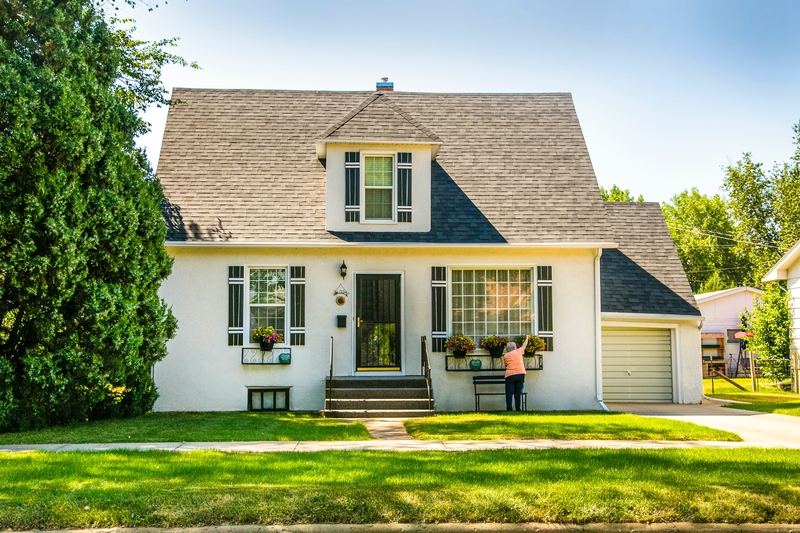Guide to Housing Assistance Programs for First-Time Home Buyers: Benefits, Eligibility, and How to Apply
"Homeownership is the American Dream, and it's important that we make that dream accessible to as many people as possible. Housing assistance programs help level the playing field and provide opportunities for families who might not otherwise be able to afford a home." - Randy Hultgren
Brief Insight
Housing Assistance Programs for Home Buyers provide financial assistance to eligible individuals or families who want to purchase a home but cannot afford the upfront costs, such as the down payment or closing costs. These programs may also offer counseling and education to help first-time home buyers navigate the home-buying process and become successful homeowners.

PHOTO: https://unsplash.com/@imacdonald3
Making Homeownership Possible: A Guide to Housing Assistance Programs for Home Buyers
Housing Assistance Programs for Home Buyers are financial assistance programs designed to help eligible individuals or families purchase a home. These programs can provide down payment assistance, closing cost assistance, and even offer reduced interest rates on mortgages. The primary goal of these programs is to make homeownership more accessible and affordable for low to moderate-income households.
Housing Assistance Programs for Home Buyers can be offered by federal, state, and local governments, as well as non-profit organizations and private lenders. Eligibility requirements may vary by program, but typically include income limits, credit score requirements, and home purchase price limits.
Some common types of Housing Assistance Programs for Home Buyers include:
- First-Time Home Buyer Programs: These programs provide assistance specifically to first-time home buyers who have never owned a home or haven't owned a home in several years.
- Mortgage Credit Certificates: These programs offer eligible home buyers a tax credit for a portion of their mortgage interest, which can help reduce their overall tax liability.
- Down Payment Assistance Programs: These programs provide financial assistance to help eligible home buyers cover the upfront costs of purchasing a home, such as the down payment and closing costs.
- Affordable Housing Programs: These programs offer homes for sale at reduced prices to eligible low to moderate-income home buyers.
The availability and structure of Housing Assistance Programs for Home Buyers can vary by region and market conditions. It is recommended that potential home buyers consult with a housing counselor or a lender familiar with the programs to learn more about the options available to them.
Interesting Facts
Some housing assistance programs for home buyers may have income limits, credit score requirements, and other eligibility criteria that applicants must meet.
Housing assistance programs for home buyers can also offer counseling and education to help buyers understand the home-buying process and make informed decisions.
The availability of housing assistance programs for home buyers varies by state and region, so it's important to research what options are available in your area.
A Brief History of Housing Assistance Programs for Home Buyers
Housing Assistance Programs for Home Buyers have been in existence in various forms for many decades. The earliest programs were established in the 1930s as part of the New Deal initiatives to address the housing crisis during the Great Depression.
One of the most significant programs was the Federal Housing Administration (FHA) which was created in 1934 to insure private mortgages and promote home ownership. The FHA played a major role in making homeownership more accessible by providing insurance to lenders, making it easier for them to offer mortgages to first-time home buyers.
Over time, the availability and structure of Housing Assistance Programs for Home Buyers have evolved and expanded to meet the changing needs of home buyers. In recent years, there has been a growing emphasis on programs that offer down payment assistance and reduced interest rates for low to moderate-income households.

PHOTO: https://unsplash.com/@kimsondoan
Funding the Dream: An Overview of Housing Assistance Programs for Home Buyers
Housing Assistance Programs for Home Buyers can be funded by a variety of sources, including government entities, non-profit organizations, and private lenders.
Government funding for these programs typically comes from the federal, state, or local level, and may be provided through grants, subsidies, or tax credits. For example, the U.S. Department of Housing and Urban Development (HUD) provides funding for programs like the HOME Investment Partnerships Program and the Community Development Block Grant Program, which are designed to help low-income households access affordable housing.
Non-profit organizations can also provide funding for Housing Assistance Programs for Home Buyers through donations, grants, and other fundraising efforts. These organizations may partner with government entities or work independently to provide financial assistance to eligible home buyers.
Private lenders can also offer programs that provide down payment assistance and reduced interest rates to eligible home buyers. These programs may be offered in partnership with government entities or as part of the lender's own initiatives to promote affordable housing.
Overall, the funding for Housing Assistance Programs for Home Buyers can be complex and may involve multiple sources and partners. The goal is to make homeownership more accessible and affordable for low to moderate-income households, and the availability and structure of these programs can vary by region and market conditions.
Last Trends
Increase in down payment assistance programs: Many housing assistance programs for home buyers now offer down payment assistance to help make homeownership more accessible. This can come in the form of grants or loans that don't need to be repaid.
Development of more flexible mortgage lending options: In order to make homeownership more attainable for a wider range of individuals and families, many housing assistance programs are working to create more flexible mortgage lending options, such as lower down payment requirements, lower credit score minimums, and more.
Navigating the Administration of Housing Assistance Programs for Home Buyers
Housing Assistance Programs for Home Buyers can be administered by a variety of entities, including government agencies, non-profit organizations, and private lenders. The specific administration structure can vary based on the program and the funding source.
Government-funded programs are typically administered by the state or local housing authorities, which are responsible for determining eligibility, processing applications, and disbursing funds. For example, the HUD-administered HOME Investment Partnerships Program provides funds to states and localities, which then distribute the funds to eligible homebuyers through local housing agencies.
Non-profit organizations can also administer Housing Assistance Programs for Home Buyers through partnerships with government agencies or by operating their own programs. These organizations may have specific eligibility requirements or focus on particular communities or demographic groups.
Private lenders can administer programs that offer down payment assistance and reduced interest rates to eligible home buyers. These programs may be offered in conjunction with government-funded programs or as part of the lender's own initiatives.
In some cases, Housing Assistance Programs for Home Buyers may be administered by a combination of entities, such as a government agency partnering with a non-profit organization to provide financial assistance and other support services to eligible home buyers.
The administration of Housing Assistance Programs for Home Buyers can be complex and involve multiple partners and funding sources. The goal is to make homeownership more accessible and affordable for low to moderate-income households, and the administration structure can vary depending on the program and the needs of the community.

PHOTO: https://unsplash.com/@towfiqu999999
Services Offered by Housing Assistance Programs for Home Buyers
Housing Assistance Programs for Home Buyers provide a range of services aimed at helping low to moderate-income households purchase their own homes. These services can include financial assistance, homebuyer education and counseling, and access to affordable mortgage products.
One of the primary services provided by Housing Assistance Programs for Home Buyers is financial assistance in the form of down payment and closing cost assistance, grants, or forgivable loans. These funds can help offset the upfront costs of purchasing a home and make home ownership more affordable for those who may not have significant savings or access to other sources of financing.
In addition to financial assistance, Housing Assistance Programs for Home Buyers often provide homebuyer education and counseling services to help prepare prospective buyers for the home-buying process. This can include topics such as budgeting, credit management, and understanding the terms of a mortgage. By providing these services, Housing Assistance Programs for Home Buyers aim to help ensure that buyers are prepared to make informed decisions about their home purchase and avoid potential pitfalls such as foreclosure.
Housing Assistance Programs for Home Buyers may also partner with lenders to offer affordable mortgage products, such as low-interest rate loans or mortgages with reduced or waived fees. These programs can make it easier for buyers to qualify for a mortgage and reduce the overall cost of home ownership.
Overall, the services provided by Housing Assistance Programs for Home Buyers are designed to make homeownership more accessible and affordable for low to moderate-income households. By providing financial assistance, education and counseling, and access to affordable financing options, these programs aim to help more families achieve the dream of owning their own homes.
Interesting Facts
The National Homebuyers Fund (NHF) is one of the largest non-profit organizations providing down payment assistance to home buyers.
The U.S. Department of Housing and Urban Development (HUD) offers various programs that can help first-time home buyers with down payment and closing cost assistance.
The average amount of down payment assistance provided by housing assistance programs for home buyers is around $10,000.
Who is Eligible for Housing Assistance Programs for Home Buyers?
Eligibility requirements for Housing Assistance Programs for Home Buyers can vary depending on the specific program and funding source. However, many programs are targeted toward low to moderate-income households, as well as first-time homebuyers or those who have not owned a home in the past three years.
In general, applicants for Housing Assistance Programs for Home Buyers will need to meet certain income requirements, which may be based on the area median income (AMI) for their location. Many programs will set income limits at or below 80% of the AMI, although some may have higher or lower thresholds.
In addition to income requirements, applicants may need to meet other eligibility criteria such as credit score, debt-to-income ratio, and employment history. Some programs may also require that the home being purchased meets certain standards, such as being located in a designated "target area" or meeting certain energy efficiency requirements.
It's worth noting that eligibility requirements and available funding can change over time, so it's important for prospective homebuyers to stay up to date on current program guidelines and funding availability.

PHOTO: https://www.pexels.com/uk-ua/@ketut-subiyanto/
The Advantages and Benefits of Housing Assistance Programs for Home Buyers
Housing Assistance Programs for Home Buyers offer several advantages and benefits to help make homeownership more accessible and affordable for low to moderate-income households. Some of the key advantages and benefits of these programs include:
- Down payment assistance: Many Housing Assistance Programs for Home Buyers offer down payment assistance in the form of grants, forgivable loans, or low-interest loans. This can help reduce the upfront costs of purchasing a home, making homeownership more affordable for those who may not have enough savings to cover a traditional down payment.
- Lower interest rates: Some programs offer lower interest rates on mortgages or other financing options, which can help reduce monthly payments and make homeownership more affordable over the long term.
- Counseling and education: Many Housing Assistance Programs for Home Buyers provide counseling and education services to help buyers navigate the home buying process and make informed decisions. This can include workshops on budgeting, credit management, and home maintenance, as well as one-on-one counseling with housing experts.
- Targeted assistance: Some programs are targeted toward specific groups, such as veterans, teachers, or first-time homebuyers. These programs may offer additional benefits or incentives to help these groups access homeownership.
- Community development: In addition to helping individuals and families purchase homes, Housing Assistance Programs for Home Buyers can also contribute to broader community development efforts. By supporting homeownership and affordable housing, these programs can help strengthen neighborhoods and promote economic stability.
Last Trends
Emphasis on providing education and counseling services to home buyers: Many housing assistance programs are now offering education and counseling services to help home buyers understand the home buying process, including everything from budgeting and saving for a down payment to understanding the terms of a mortgage loan.
Focus on innovative and sustainable housing solutions, such as eco-friendly and smart homes: As more people become interested in eco-friendly and smart homes, some housing assistance programs are starting to focus on providing innovative and sustainable housing solutions that are energy-efficient and affordable in the long term.
Considering the Disadvantages of Housing Assistance Programs for Home Buyers
While Housing Assistance Programs for Home Buyers can offer several advantages and benefits, there are also some potential disadvantages and limitations to consider. These may include:
- Limited availability: Housing Assistance Programs for Home Buyers may have limited funding or may only be available in certain areas or for specific groups. This can make it challenging for some buyers to access these programs.
- Income restrictions: Many programs have income restrictions that limit eligibility to low or moderate-income households. This can make it difficult for higher-income buyers to access assistance, even if they may still face affordability challenges.
- Additional requirements: Some programs may require buyers to meet additional requirements, such as completing homeownership education courses or using approved lenders or real estate agents. These requirements can add complexity to the home-buying process and may limit buyers' flexibility.
- Repayment requirements: Some forms of assistance, such as forgivable loans or down payment assistance, may require repayment under certain circumstances. Buyers should carefully review the terms of any assistance they receive to understand their repayment obligations.
- Potential impacts on home values: In some cases, the availability of Housing Assistance Programs for Home Buyers in a specific area may lead to an increase in demand for homes and higher home values. While this can be positive for existing homeowners, it can also make it more challenging for new buyers to enter the market.

PHOTO: https://unsplash.com/@homajob
The Path to Assistance: Applying for Housing Assistance Programs for Home Buyers
To apply for Housing Assistance Programs for Home Buyers, individuals typically need to follow these general steps:
- Determine eligibility: Check the program's eligibility requirements to ensure you meet the necessary criteria, including income limits, credit scores, and any other program-specific requirements.
- Find a participating lender: Many programs require buyers to work with participating lenders who are familiar with the program's guidelines and requirements.
- Complete an application: Once you have identified a participating lender, you will need to complete an application for the program. This may involve providing documentation of your income, assets, and other financial information.
- Attend homebuyer education courses: Many programs require buyers to complete a homebuyer education course before receiving assistance. These courses may cover topics such as budgeting, credit management, and the home-buying process.
- Receive approval and assistance: If you meet the program's eligibility requirements and complete all necessary steps, you may receive approval for assistance in the form of down payment assistance, grants, or other financial assistance.
- Housing Assistance Programs for Home Buyers provide financial assistance to eligible individuals who are looking to purchase a home.
- These programs can offer a variety of benefits, including down payment assistance, grants, and low-interest loans.
- Eligibility requirements vary by program but generally include income limits, credit scores, and other criteria.
- Applicants typically need to work with participating lenders and complete an application, along with attending homebuyer education courses.
- While these programs can be a helpful resource for homebuyers, they may also have limitations and disadvantages, such as longer processing times and limited funding availability.
- It is important to thoroughly research and understand the requirements and benefits of each program before applying.
FAQ
What types of financial assistance are available through housing assistance programs for home buyers?
Housing assistance programs for home buyers may offer a variety of financial assistance, such as down payment assistance, grants, or low-interest loans. Some programs may also provide assistance with closing costs or home repairs.
How do I apply for a housing assistance program for home buyers?
To apply for a housing assistance program for home buyers, you will typically need to work with a participating lender and complete an application. You may also need to attend homebuyer education courses and provide documentation of your income, assets, and other eligibility requirements.
How long does it take to process an application for a housing assistance program for home buyers?
Processing times for housing assistance program applications can vary depending on the program and the number of applications received. Some programs may have longer wait times or limited funding availability, so it is important to research and understand the requirements of each program before applying.
Can I use a housing assistance program for home buyers to purchase any type of home?
Eligibility requirements and restrictions on the type of homes that can be purchased may vary by program. Some programs may have restrictions on the purchase price, location, or condition of the home. It is important to understand the requirements of each program before applying.
Can I use a housing assistance program for home buyers with other types of financing, such as an FHA loan?
Some housing assistance programs for home buyers may allow you to combine their financing with other types of financing, such as an FHA loan. However, eligibility requirements and restrictions may vary by program, so it is important to research and understand the requirements of each program before applying.